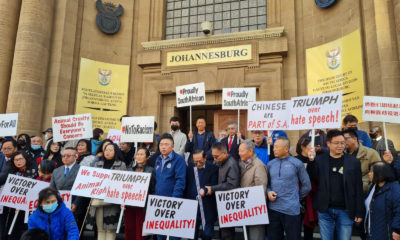
World

China plays ‘third man’ in Middle East
As the Israel-Hamas war grinds on relentlessly and a deal remains elusive, the United States (US) isn’t the only sheriff in town. In recent months, Beijing has convened Palestinian factions to seek unity, stepped up contacts with Iran, and increased its diplomacy in the region. With significant geo-economic interests, China has much to lose from Middle East instability, especially an uncontrolled regional war. The SA Jewish Report spoke to several China scholars to understand the dynamics better.
Professor Chris Alden, a China expert at the London School of Economics and Political Science, said, “The overarching policy of China towards the Middle East is to be involved as a more active player going beyond its substantial economic interests, and to signal to the world that it’s a system stabiliser, with stability best achieved through negotiation and mediation.”
China, the world’s second-largest economy, imports half its oil from the Middle East. Its annual trade with the region is more than $500 billion (R8.9 trillion). Beijing’s relations with the region have grown while the US’s have shrunk, with diminishing American dependence on Middle Eastern oil.
“China thus has space to fill the vacuum,” said Sanusha Naidu, senior research fellow at the Institute for Global Dialogue. “China wants to protect its supply chain,” she said. “China also lacks the colonialist baggage of the West, and is more trusted than the US by the Arab world.”
Professor Garth Shelton, a security studies expert formerly at the University of the Witwatersrand, said “Given the economic importance of the Middle East to China, Beijing is increasingly concerned about a wider war, which would be damaging to China’s economic and political interests. China has a major opportunity to be a force for moderation.”
Gustavo de Carvalho, senior researcher at the South African Institute of International Affairs, said, “Engaging in the Israel-Hamas conflict is a low-risk, high-reward opportunity for China. By facilitating Palestinian unity talks, China could earn prestige for contributing to negotiations and long-term stability. If these efforts fail, China is unlikely to be blamed. If they succeed, the nation stands to benefit from regional stability and enhanced reputation.”
China has a modest mediation track record, including in Sudan, the Iran-Saudi Arabia rapprochement in 2023, and supporting both countries’ entry into the BRICS (Brazil, Russia, India, China, South Africa, Egypt, Ethiopia, Iran, Saudi Arabia, and the United Arab Emirates) organisation. It’s increasing its military might, economic power, and is on the United Nations Security Council.
Dr Cobus van Staden, the managing editor of the China-Global South Project, said “China has been involved in back-channel diplomacy since 7 October. Sometimes it’s quieter than others. Trying to reconcile Fatah and Hamas builds on the earlier brokering of the Iran-Saudi deal. Its fears about escalation is probably driving the current engagement.”
Alden said China’s persistent adherence to UN resolutions on Israel-Palestine had been “a signature across Chinese engagement. But this isn’t the China of a decade ago that could splash out cash to pursue its economic interests like it did in Africa and Latin America. It nonetheless has capacity in all the areas that the region needs, including consumer power for a post-oil future for countries locked into the Chinese economy.
“China sees the US as a serial breaker of stability,” he said. “Its actions, diplomacy, and military interventions don’t resolve problems, while the Chinese believe their diplomacy leads to stability.”
“The US is out of step with broad regime opinion in the Middle East,” Alden said. “China will emphasise this ‘negative’ role in working against the aspirations of Palestine. China is slowly corroding the pre-eminence of the US in the region. But the catch is that China doesn’t have much to offer regarding hard security. The Saudis still want US security guarantees, but are worried about uneven US commitment after the abrupt pullout from Afghanistan. But they have no real alternative from China, at least at this point.”
So could China lean on Iran? The China-Iran relationship is long-standing, predating the 1979 Islamic Revolution. China sold weapons to Iran in its 1980-1988 war with Iraq. Iran sees China as a development-oriented partner, an alternative to the West, and is interested in groups like the Shanghai Co-operation Organisation and BRICS, Alden said.
“China certainly holds influence over Iran due to positive bilateral relations, trade, and tacit support,” said De Carvalho. “However, its leverage isn’t unlimited. Iran is too significant a player to be completely subservient. While China seeks regional stability and may push for Iranian restraint, its influence has limits as Iran’s actions are part of more complex domestic, regional, and global calculations.”
“Iran has strong ideas of its own and its role in the world. There’s a commercial basis to the relations. China was key in getting Iran into the BRICS, and that will strengthen ties. It may have a voice, but China doesn’t call the shots,” said Van Staden.
Does China have something unique to contribute in the Middle East? According to Van Staden, “China has an impressive, rapid non-Western development record. It also lacks a history of colonialism, and the US’s long history of supporting Israel. That puts it in a position to work with partners like Iran, Egypt, or others.”
“As China seeks operational space, it’s less about ideology and more about pragmatism, De Carvalho said. “In the Middle East, China stands to lose the most if things get any worse.”
“China has a bigger mission than a new Cold War,” Van Staden said, “and that is to carve a space for itself as an emerging superpower, and build networks and solidarity. That doesn’t mean that it necessarily wants to replace the US in something like protecting shipping in the Persian Gulf and Red Sea. I don’t think it does. It’s positioning itself in the larger split between the Global North and Global South. But don’t expect China to step in and transform the situation overnight – so much depends on Israel and the US.”










